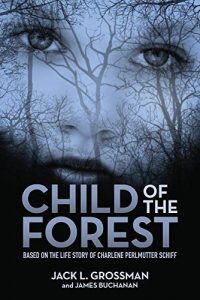Child of the Forest

Child of the Forest, Based on the Life Story of Charlene Perlmutter Schiff, by Jack L. Grossman and James Buchanan. The 255-page book was published in 2018 by SPARK Publications, Charlotte, NC. The author writes in the Bibliography that the book is “a work of creative nonfiction,” and the sources were used “to create an understanding of the place, time, history, and emotional and mental effects of the trauma Musia suffered.”
Shulamit (Charlene) Perlmutter (1929-2013), was affectionately called Musia (Moosha). She was born in Horochów, Poland, which is now Ukraine. Her father, Simcha Perlmutter, was a Philosophy Professor at the University in Lwów. Charlene’s mother was Fruma Lieberman Perlmutter, and Charlene had an older sister named Tchiya. Conditions for the family in Horochów did not change significantly after the Soviet occupation of Eastern Poland in 1939, a result of the Nazi-Soviet Pact. However, Hitler’s betrayal of Stalin and the Soviets (Operation Barbarossa, June 1941) brought the family’s life under Germany’s control. When the Germans entered the Perlmutter home, their father (a Zionist) attempted to escape out the back door but was captured. It was later learned that he and other men were forced to dig pits and were then shot. Fruma Perlmutter and her two daughters had to leave their home and move into the ghetto. Here, they starved and struggled to survive until the Nazis ordered the liquidation of the ghetto. It was August 1942, and Charlene and her mother escaped and hid in the bulrushes at the edge of the river. Her sister Tchiya fled with friends but was later betrayed and did not survive. Charlene was twelve years old at the time. For hours, and then days, Charlene and her mother remained hidden, sitting in the water up to their necks, while “Flames in the ghetto lapped skyward, casting light over the riverbank tableau of bent bodies and youthful killers. Firelight reached into the bulrushes and river …”
In the water, Charlene falls asleep. When she awakens, she realizes that her mother is gone, and she then manages to escape into the forest, guided by her mother’s voice in her thoughts.
“There are no miracles here, neshomeleh, only love, and that is what we live for.”
“But Papa said God is abundant in compassion and God fills the world.”
“Yes, I know, but his compassion is our love, and that is what we live for.”
“Yes, Mama.”
Charlene was never able to learn what happened to her mother, but the soothing, motherly, warning voice remains with her the entire time she is hidden in the forest. Her mother’s urgent voice first leads her to the home of a couple who had been friends of the family, but they turn her away, the dangers of hiding a Jew too great, while the woman gives her some food to carry. She briefly joins a group hiding in the forest and manages to escape after they are attacked and killed. She is forced to scavenge for food, whatever will fill her stomach: mushrooms, berries, tree nuts, things crawling on the ground, and, eventually, rats that she kills with her small penknife. She breaks into cellars for potatoes, and into barns for sour milk and perhaps some deep sleep in the hay. She finds some warm clothing and shoes and socks in two wagons, and bathes in brooks. She digs “small graves” each night in which to sleep. More »